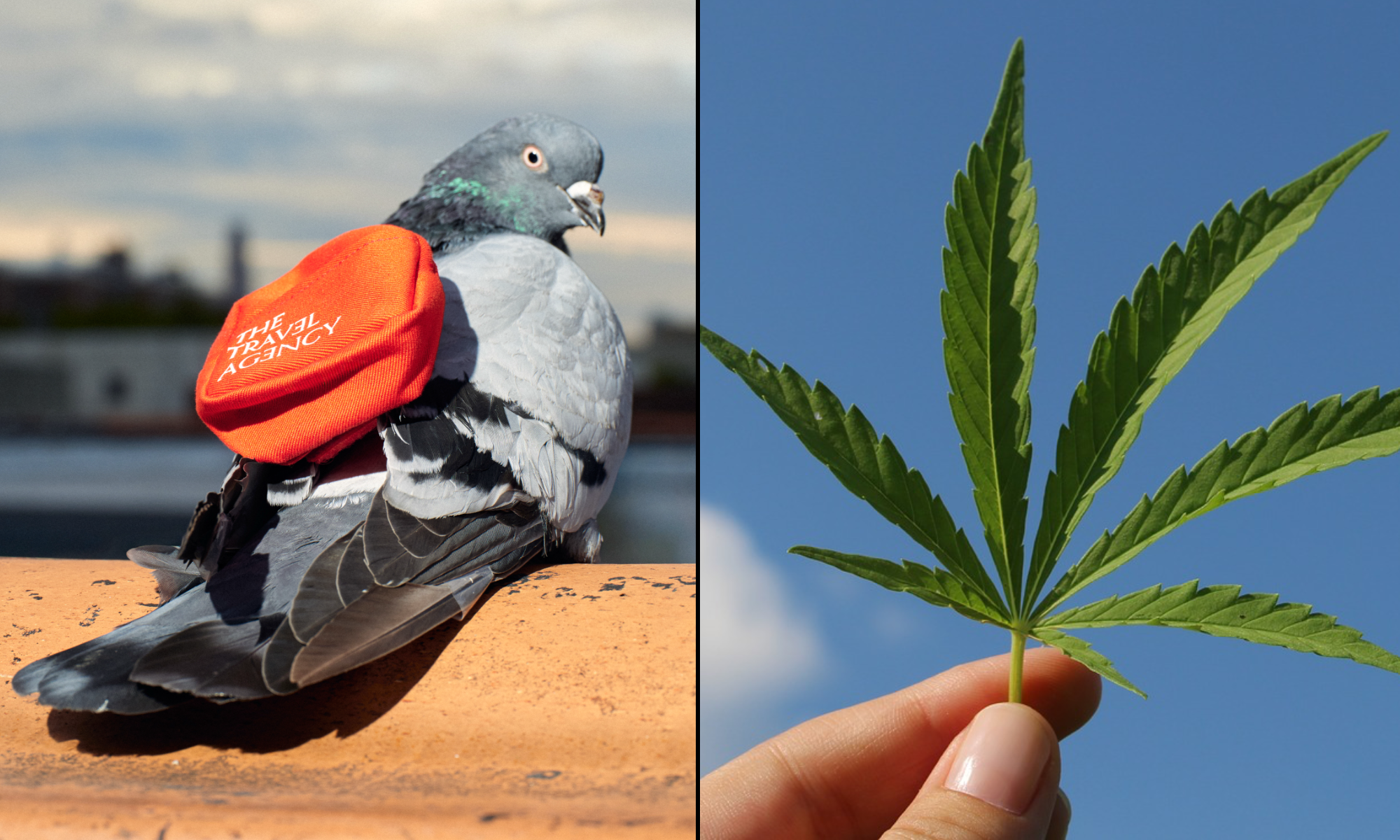Business
No, Carrier Pigeons Will Not Be Delivering Marijuana In New York, Retailer Confirms After Marketing Stunt Fools Media Outlets

An elaborate marketing stunt from a New York marijuana business evidently fooled more than a few media outlets into believing that carrier pigeons would soon be deployed to make cannabis deliveries throughout New York City.
Advertisements and social media posts from the marijuana retailer The Travel Agency have been promoting the launch of “Project Pigeon,” which the business said would involve a fleet of 20 birds trained to fly cannabis to adults in Manhattan and Brooklyn beginning next year.
In a press release last week, the company said it completed a successful test trial with pigeons adorned with mini-backpacks. The announcement said the birds would be able to carry up to one gram of marijuana per delivery.
“As The Travel Agency, it’s only natural we’d explore all modalities of travel for our delivery service, even pigeons,” Arana Hankin-Biggers, co-founder of The Travel Agency, said. “And being in NYC, we thought there’s no better courier than the ever-present and beloved pigeon.”
But while outlets from Fox 5 New York to Time Out ran with the story, the retailer has since confirmed that the pigeon program was simply a marketing stunt—and, evidently, a convincing one to some, as The New York Post first reported. A PR rep for The Travel Agency confirmed with Marijuana Moment on Wednesday that the pigeon campaign wasn’t real.
News about the made-up initiative even received pushback from certain animal rights activists such as Megan Walton from the Pigeons for Miles avian sanctuary. She said that, even though it ended up being a gimmick, “it’s still very upsetting to even conceptualize a campaign like this, centering on exploiting pigeons.”
The press release about the test trial last week said that the “Cannabis Carrier Pigeon Program is not about putting birds to work; it’s about reimagining delivery with a very New York sense of ingenuity.”
“By enlisting the city’s most iconic residents as couriers, The Travel Agency has created what might be New York’s smartest delivery system yet—using what the city already has in abundance to outfly traffic, cut through congestion, and get orders where they need to go,” it said.
Part of the giveaway that the pigeon campaign was made up goes back to state and local laws on cannabis deliveries, which lay out specific safety and anti-diversion rules that licensed businesses must follow to make those deliveries. That includes ID verification upon receipt of cannabis products, which a pigeon ostensibly would not be capable of performing.
But in any case, the stunt is an example of the normalization of the adult-use marijuana market in New York, which has seen over $2 billion in cannabis sales since it launched. And $1 billion of those purchases have been made in 2025 alone, state officials recently touted.
Earlier this year, another cannabis marketing prank also pulled one over on many, with Drippy—which sells drinks with 10mg of THC and 10mg of CBN—convincing people its beverages would be made available to adults on certain domestic flights with Virgin Atlantic. And while the stunt proved effective, with certain media outlets reporting the partnership as fact, that didn’t end up being the case.
Virgin Atlantic didn’t appear to have any hard feelings after the company made false and satirical claims about a deal to sell its THC-infused beverages on flights—but the airline said it had to draw a line when it came to an AI-generated video and fake letter from its CEO about the supposed partnership.
Meanwhile, back in New York, given confusion within the marketplace about timelines for provisional marijuana business licenses, the Cannabis Control Board (CCB) recently said it will be extending the renewal deadline for conditional adult-use until December 31, 2026.
Part of the uncertainty surrounding provisional licensees concerns a recently identified zoning issue impacting more than 100 cannabis businesses that are apparently located too close to public schools or places of worship than is allowed under current statute. Gov. Kathy Hochul (D) has said that she will be pushing the legislature to amend the state’s marijuana law to address the issue.
Meanwhile, both chambers of the New York legislature recently passed legislation that would extend the deadline for some marijuana businesses to file electronic tax returns, sending the proposal next to the governor’s desk.
If signed into law, the measure would give cannabis manufacturers and distributors 30 extra days to submit their tax returns following the end of each quarterly tax period. Currently the companies have a 20-day window to file the documents, which the legislation would extended to 50 days.
Sponsors of the bill have noted that Hochul vetoed an earlier cannabis business tax reform proposal late last year, claiming it would “pose significant operational challenges for the State and confusion for taxpayers,” but that they’ve worked to address those concerns in the current version.
The earlier, vetoed measure would have allowed marijuana growers and processors to pay excise taxes on an annual basis rather than quarterly—a change that would have extended the same treatment to cannabis as the state already offers the alcohol industry.
In July, meanwhile, New York officials announced the first round of grants under a $5 million program to help retail marijuana businesses owned by justice-involved people cover startup costs.
About three months after opening up applications for the Conditional Adult-Use Retail Dispensary (CAURD) Grant Program, The Office of Cannabis Management (OCM) and Empire State Development (ESD) have announced that they have awarded 52 licensed dispensaries up to $30,000 each in funds meant for startup and operational costs such as rent, renovations, inventory tracking and security systems.
To qualify for the program, applicants need to have been “justice involved”—in other words, impacted by a marijuana-related conviction—and have some experience running a profitable business.
Separately, OCM recently launched an online map that’s meant to help adults locate licensed marijuana retailers—one of their latest efforts to encourage consumers to buy their cannabis from the regulated market.
After a rocky rollout of the state’s legalization law opened the door to a proliferation of illicit marijuana shops, the governor and regulators have prioritized educating the public about the need to purchase their products from licensed dispensaries as a health and safety imperative.
The broader New York campaign has also involved digital ads and educational resources, including a guide on safe consumption practices, as well as graphics and videos featuring licensed cannabis business owners and messaging about the benefits of participating in the regulated market.
OCM also advises that “continued enforcement against the illicit market is critical to building a health regulated market,” pointing to what it describes as successful enforcement efforts in 2024. Last spring, for example, officials in New York City launched Operation Padlock, an enforcement initiative meant to shutter illegal storefronts. Within months, licensed shops that were open before the operation began saw sales climb 105 percent, according to an OCM survey.
Regulators are also moving forward with new proposed regulations around the state’s so-called “cannabis showcase” program, which allows licensed businesses to sell to consumers at pop-up, farmers market-like events.
As originally authorized, the showcase events were largely in response to the slow rollout of New York’s adult-use marijuana program, which faced multiple delays in implementation amid litigation and other matters.
Separately Hochul signed state budget legislation that did not include a controversial earlier provision that would have allowed police to use the smell of marijuana as probable cause that a driver is impaired and then force them to take a drug test.
Amendments made in the legislature removed the provision, which a coalition of 60 reform groups had argued in a letter to Hochul and top lawmakers would “repeat some of the worst harms of the War on Drugs” and allow law enforcement to “restart unconstitutional racial profiling of drivers.”
In April, New York cannabis regulators and labor officials announced the launch of a workforce training program aimed at “providing comprehensive safety education to workers” in the state’s legal marijuana industry.
Separately, OCM’s press secretary indicated the office is working on plans to expand permitting and licensing rules that could allow adults to buy and consume marijuana at movie theaters. Authorizing sales of cannabis products at theaters would set New York apart as it continues to build upon the state’s legalization law.
Earlier this year, a collective of businesses licensed under the CAURD program called on Hochul to forgive tens of millions of dollars in high-cost loans issued under a governor-created social equity loan fund.
A state lawmaker said in December that there’s a need to extend financial aid to CAURD license holders, many of whom are struggling under the high-cost loans.
Critics—including the NAACP New York State Conference, Black Cannabis Industry Association, Minority Cannabis Business Association, Service Disabled Veterans in Cannabis Association, Drug Policy Alliance, NYC NORML and VOCAL-NY—wrote to the governor earlier that month to express dismay at what they described as marijuana regulators’ “efforts in service of big corporations at the expense of small business and equity outcomes.”



